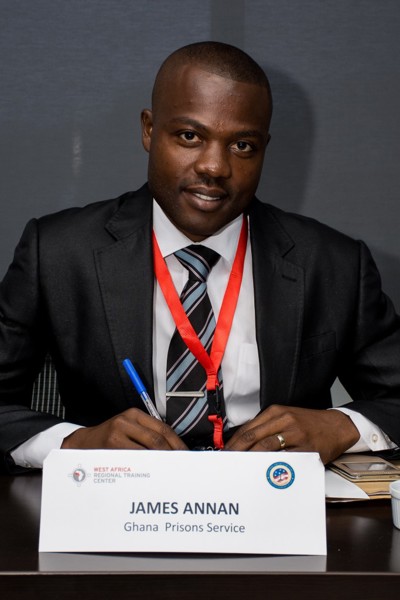Alumni In Focus
Mr. Annan

We are proud to feature Mr. Annan from the Ghana Prisons Service who has made continuous progress in his law enforcement career. He is happy to share his success story with the RTC Family.
SUCCESS STORY
Mr. Annan during the Alumni Network Event at the RTC
My name is Mr. Annan - an Assistant Superintendent of Prisons (ASP) in the Ghana Prisons Service stationed at Prisons Headquarters, Accra. I was enlisted into the Service in 2012 as an Officer Cadet. After a successful six months para-military training at the Prison Officers’ Training School (POTS). I was commissioned into the Superior Officers’ Corps by the President of the Republic. I started my career as a prison officer at Kumasi Central Prison, where I served as a Deputy Staff Officer and was later appointed the Ashanti Regional Public Relations Officer. By dint of hard work, I was transferred to the Ghana Prisons Headquarters.
The Embassy of United States of America, in collaboration with the Department of State, Bureau of International Narcotics and Law Enforcement Affairs (INL), organized a five-day workshop on the theme: “Offender Classification” for thirty participants from the Ghana Prisons Service in 2016. As a result, I had the opportunity to join my colleagues at the Regional Training Center (RTC) for this special training program. The participants were tactfully selected from the various prison installations across the key regions of Ghana.
The week-long training workshop forms part of U.S. Government support towards Project ‘Efiase’ and the 10-Year Strategic Development Plan of Ghana’s Prisons. It was also aimed at equipping participants (prison officers) to develop the best classification instruments that could facilitate the reforms agenda in Ghanaian prisons.
My work schedule as Protocol and Media Relations Officer at the Prisons Council Secretariat gave me ample exposure in the media fraternity especially in my quest to pursue advocacy drive for Project ‘Efiase.’ It was not surprising that the Council nominated me to attend the Offender Classification workshop for Ghana Prisons Service at the RTC.
Project ‘Efiase’ is an initiative of the Ghana Prisons Council. The Project has a three-pronged approach which is: advocacy for prison reforms; fund raising towards the implementation of Ghana Prisons which is a 10-Year Strategic Development Plan; and to engage the Service in public-private partnership (PPP).
Fascinatingly, memories of some of the major topics are still fresh on my mind. Notably among them are Prisoner Classification, Risk and Classification System, and Classification Instruments. The instructor team was made up of four visiting American experts with rich experience in Corrections.
One of the instructors who is a Deputy Director of Field Support Services from Maryland Department of Corrections – Charvette, gave an inspiring presentation on the subject – Classification. She made reference to some of the best practices in Maryland. Subsequently, I was convinced that the condition of Ghanaian prisons could be improved significantly, particularly the spate of overcrowding nationwide.
Another instructor - Robert from the Colorado Department of Corrections took participants through the framework of creating inmates’ classification instrument. Consequently, each participant was provided copies of the presentation and samples of classification instruments from Maryland and Colorado Corrections Departments respectively. The printed materials were very helpful because of the quality and volume of information they contained, as far as developing classification instruments are concerned.
In line with the program, participants were divided into smaller groups to come up with suitable classification instruments for the Prisons Service. I must admit that the group work was quite practical, interactive and full of fun. Each group had the opportunity to present their work to the class and participants made constructive criticisms and suggestions after each presentation.
In fact, the suggestions and input of our instructors were not left out. The contribution from the other facilitators including Kenneth and Vanessa, both Senior Corrections Advisors from the United States, added glamour to the various group discussions throughout the workshop. ‘Experience is the best teacher of all,’ so we drew a lot from their wealth of knowledge and experience.
The entire group worked as a team to develop an ‘Initial Classification Instrument’ and ‘Security Reclassification Instrument’ for the Prisons Service. Following that, I was tasked to compile a report (proposal) which was submitted to the Prisons High Command for consideration.
It is electrifying to learn that the above proposed classification instruments have been rolled out at the Nsawam Medium Security Prison in Ghana on pilot basis. Meanwhile, there are plans to implement the proposed instruments across all the 43 prison establishments in the near future.
The introduction of an effective classification instrument in the Prisons Service is long overdue. As a matter of fact, there are a number of factors that hamper offender classification in Ghanaian prisons such as inmates’ congestion, poor infrastructure and lack of electronic equipment.
On this note, I have the singular honor to extend my heartfelt gratitude to the U.S. Embassy, Management and staff of RTC for the opportunity to learn something new on the job. I am a proud alumnus of the RTC because I have been adequately equipped to create any form of instrument to classify inmates’ according to their offense, their severity of risk to other inmates, officers and even the facility.
There is no doubt that I am a proud ambassador of RTC in the Ghana Prisons Service. In the year 2016, I had the privilege of representing the Service at the first ever RTC Alumni Event in Ghana. It was a mixed feeling to interact with other colleagues from the various security and law enforcement agencies. I, therefore, look forward to future collaboration with other alumni within and outside Ghana.


